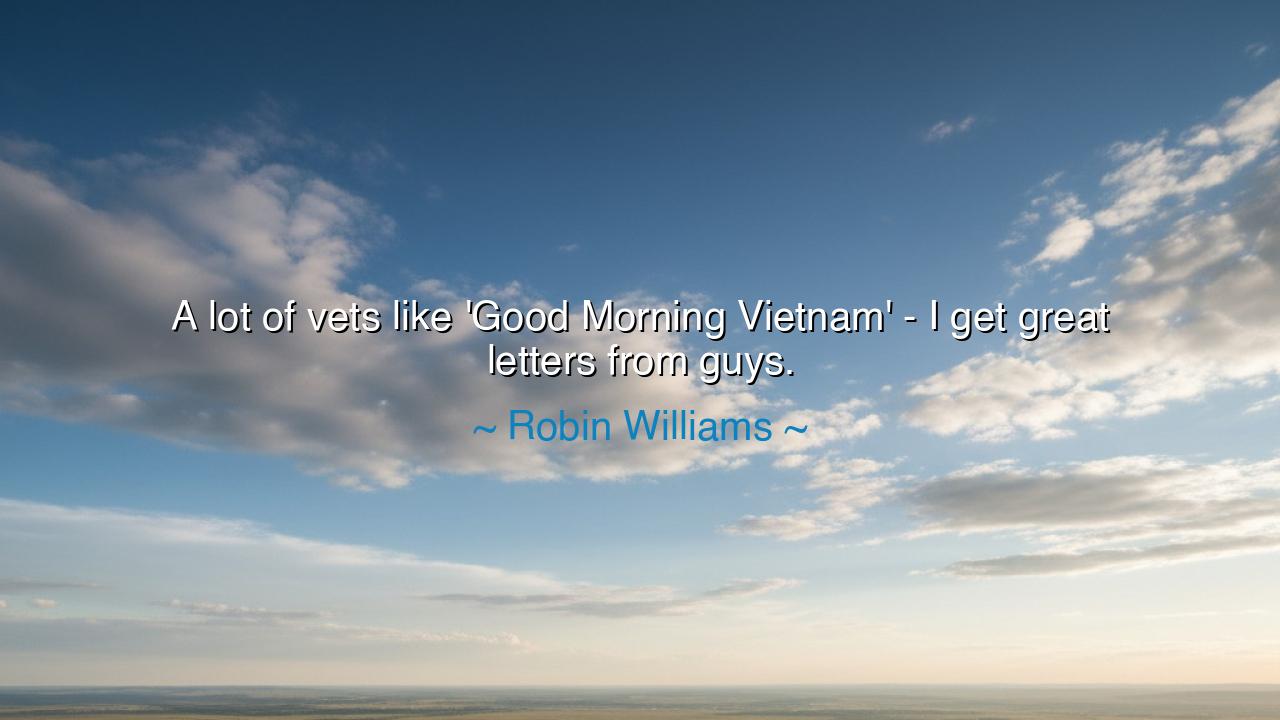
A lot of vets like 'Good Morning Vietnam' - I get great letters






The words of Robin Williams carry both laughter and sorrow, as so much of his art did: “A lot of vets like Good Morning Vietnam — I get great letters from guys.” On the surface, this is a light remark, spoken in gratitude for the approval of those who lived through the war he portrayed. Yet within it lies something deeper: the recognition that comedy and storytelling can heal wounds that bullets and bombs have left behind. Williams did not merely perform in a film; he gave voice to the pain, absurdity, and humanity of soldiers whose sacrifices had often been forgotten.
The meaning of his words is that art, when touched by truth, can bridge the gulf between experience and remembrance. Veterans who endured the chaos of Vietnam found in his performance not mockery but recognition. Through humor, Williams captured the surreal clash of war — a place where fear and laughter coexisted, where survival often meant finding joy in the smallest absurdities. For the veterans, the letters they sent to him were not simply fan mail; they were confessions of gratitude, acknowledgments that someone had transformed their silent suffering into something the world could see, hear, and feel.
The origin of this moment lies in the real-life story of Adrian Cronauer, the Air Force radio DJ whose irreverent broadcasts inspired the film. Cronauer brought light to soldiers through jokes, music, and a refusal to surrender to despair. Williams, in stepping into this role, embodied not only Cronauer but the resilience of all who must laugh in the face of death. The veterans recognized themselves in that portrayal: young men caught in the madness of a war far from home, clinging to humor as a shield against the unbearable.
History has known this power before. In the trenches of World War I, soldiers recited jokes and sang bawdy songs to ward off despair. In World War II, Bob Hope carried his comedy across the seas, lifting spirits on battlefields with humor sharper than steel. Just as the ancients used jesters, poets, and musicians to relieve kings in times of war, so too have modern warriors found solace in the laughter of those who dare to speak joy into darkness. Robin Williams became part of this lineage, a warrior of humor who armed himself not with weapons, but with words and wit.
There is also a deeper reflection here on the bond between artist and audience. Williams did not fight in Vietnam; he did not march through the jungles or face the fire of combat. Yet by listening, by feeling, by embodying the absurdity and humanity of the soldier’s experience, he gave them recognition. His joy became their joy, his performance their mirror. When he said, “I get great letters from guys,” he was humbled, knowing that he had earned, in some small way, the trust of men who had risked everything.
The lesson for us is powerful: never underestimate the ability of art — whether through comedy, storytelling, or song — to heal, to dignify, to give voice to the voiceless. Not all of us can be soldiers, not all of us can fight wars, but each of us can contribute to healing the wounds of others by honoring their experiences, by listening, and by bringing light where darkness reigns. Sometimes, laughter is not frivolity but survival, not entertainment but medicine for the soul.
So let us carry this teaching forward: seek ways to be a source of light for others, especially for those burdened by memories too heavy to bear alone. If Robin Williams could, through one film, bring solace to men scarred by war, then we too can bring comfort into the lives of those around us. Whether through humor, kindness, or simple presence, let us strive to be like the comedian who gave warriors their laughter back — for in lifting another’s spirit, we participate in a heroism of a different kind, a heroism not of battle, but of healing.






AAdministratorAdministrator
Welcome, honored guests. Please leave a comment, we will respond soon